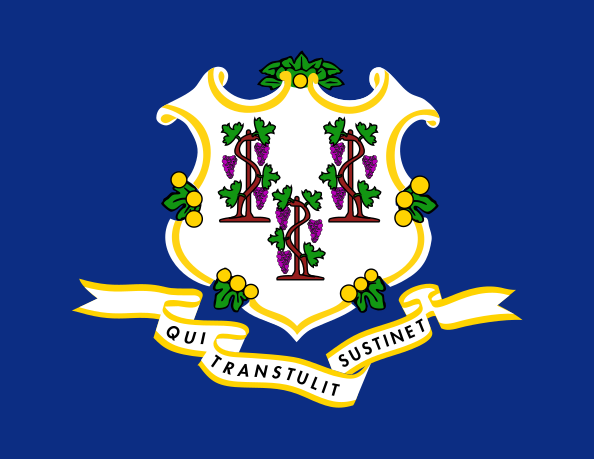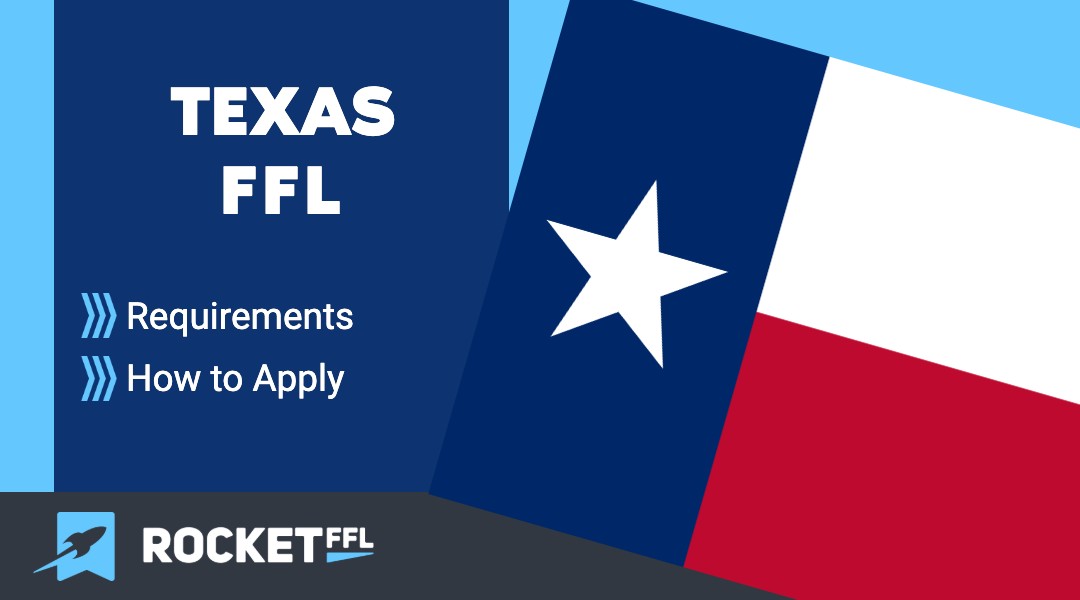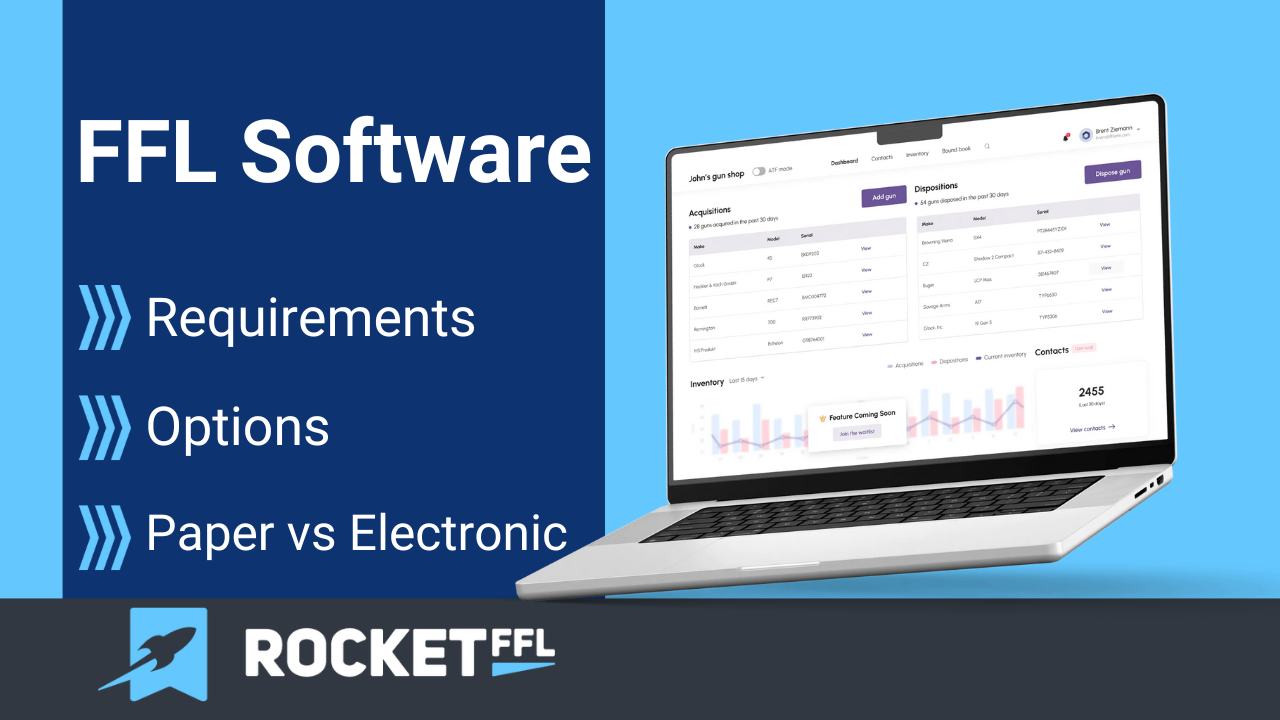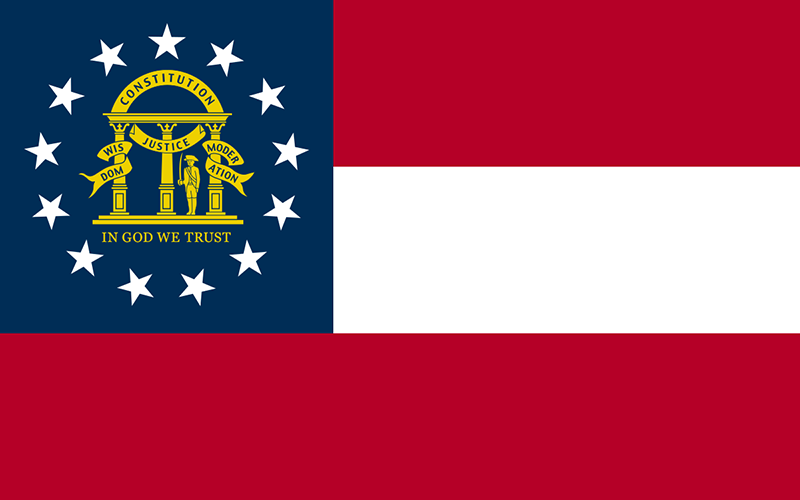If you’re thinking about getting a Federal Firearms License (FFL) in Texas so that you can be a gun manufacturer or firearms dealer (even from your home) in the lone-star state, then you’re in the right place. Most of the requirements for getting your FFL License are federal rules and regs, however, each state also […]

How to Get Your FFL in Connecticut in 4 Steps
Obtaining a Federal Firearms License (or FFL) in Connecticut enables you to handle the sale and distribution of firearms. The myriad of laws and regulations in this small state are some of the most restrictive in the country.
Needless to say, getting your FFL in Connecticut is no easy feat. But using Rocket FFL’s easy-to-understand course makes the process more straightforward and helps eliminate confusion and failure.
In this article, we will discuss:
- FFL Cost
- Steps to getting your FFL in Connecticut
- Federal Requirements for an FFL
- Connecticut State Requirements for an FFL
- Connecticut Local (City/Town) FFL Requirements
- FAQs and additional resources
FFL Cost in Connecticut
How much does an FFL cost? An FFL typically costs between $30-$200 for the first 3 years, but with Connecticut’s extra mandatory training and certificates, you can expect to pay at least double that.
When you fill out an FFL application with the ATF (Bureau of Alcohol, Tobacco, Firearms, and Explosives), you apply for different license types.
Specific license types will vary in price according to the different functions they allow the licensee to execute. This includes a licensee who is just trying to casually sell a few handguns, incorporate gunsmithing, or transfer firearms between gun owners, charging a transfer fee.
To handle NFA items (such as short-barrel rifles (SBRs), machine guns, silencers, etc.), you must pay additional costs in the form of a SOT license registration.
FFL License Cost by Type
| FFL License | Application | Renewal | Years |
|---|---|---|---|
| Type 01 | $200 | $90 | 3 |
| Type 02 | $200 | $90 | 3 |
| Type 03 | $30 | $30 | 3 |
| Type 06 | $30 | $30 | 3 |
| Type 07 | $150 | $150 | 3 |
| Type 08 | $150 | $150 | 3 |
| Type 09 | $3,000 | $3,000 | 3 |
| Type 10 | $3,000 | $3,000 | 3 |
| Type 11 | $3,000 | $3,000 | 3 |
Steps to Getting Your FFL
To get your FFL in Connecticut, you need to:
- Ensure you meet the federal and state requirements for an FFL
- Choose your FFL type
- Take an FFL course
- Submit your FFL application forms
Step 1: Ensure You Meet FFL Federal Requirements
First, you need to make sure that you meet all Federal requirements before attempting the more restrictive state guidelines. For the ATF, these are the same for every state across America.
Step 2: Choose Your FFL Type
Second, apply for the desired type of FFL. If you are trying to become an FFL dealer, you will need to choose the type of license that will allow you to lawfully operate your firearms business.
More often than not, you will probably need either a Type 01 license (for most firearms dealers and gunsmiths) or a Type 07 license (for manufacturing). A Type 07 license lets you both manufacture and sell firearms and ammo.
To sort which FFL best suits your needs, read this more in-depth article.
Some types of firearms and accessories require you to be an SOT (Special Occupational Taxpayer). SOTs can only be applied for after being assigned an FFL number. Many of these requirements are derived from the National Firearms Act of 1934 (NFA) and were later amended with Title II of the Gun Control Act.
You’ll need to be an SOT if you plan to sell NFA items such as:
- Full-auto machine guns
- SBRs (rifles with a barrel shorter than 16″ or an overall length under 26″)
- Silencers
- Short-barreled shotguns (shotguns with a barrel shorter than 18″ or an overall length under 26″)
- Destructive devices (grenades, mines, or bomb-like accessories)
- Any other weapons (pen guns, specific special handguns, etc.)
The table below describes each FFL License type and which SOT Class you’ll need to apply for after getting your FFL to sell firearms covered under the NFA.
We cover all of the specifics of SOT classes and the NFA in our Get Your FFL Course.
FFL License Types
| FFL License Type | FFL License Purpose | SOT Class |
|---|---|---|
| Type 01 FFL | Dealer/Gunsmith of Firearms | 3 |
| Type 02 FFL | Pawnbroker/Dealer of Firearms | 3 |
| Type 03 FFL | Collector of Firearms | n/a |
| Type 06 FFL | Manufacturer of Ammunition | n/a |
| Type 07 FFL | Manufacturer/Dealer of Firearms and Ammunition | 2 |
| Type 08 FFL | Importer/Dealer of Firearms | 1 |
| Type 09 FFL | Dealer of Destructive Devices | 3 |
| Type 10 FFL | Manufacturer/Dealer of Destructive Devices | 2 |
| Type 11 FFL | Importer/Dealer of Destructive Devices | 1 |
Step 3: Take an FFL Course
Next, attend an FFL course from an experienced instructor.
Planning to get your FFL License can be a headache. That’s why I developed Rocket FFL. I compiled decades of research and work as an attorney in the firearms industry to help first-timers get their FFL pain-free.
The course here will help you obtain a federal firearms license and cover every aspect of how to get your FFL in Connecticut.
I’m a firearms attorney that specializes in ATF compliance. I could let people mess up their FFL application and then make plenty of money to fix it for them later.
But I want to help as many of my fellow firearms industry entrepreneurs learn how to do it right the first time.
You can get the FFL Course and SOT Course combo for an extra $10. Then, you’ll learn how to apply to buy and sell silencers and short-barreled rifles in addition to standard firearms covered by just your FFL.
Step 4: Submit Your FFL Application Forms
If you’ve made sure all requirements (federal and state) are met, verified the appropriate FFL type for your business, and taken the Rocket FFL course, you are ready to “pull the trigger” and submit the documents for your FFL!
This requires multiple forms and extra steps depending on your location. However, if you took the Rocket FFL course, you’ll have every detail and access to every form needed to apply to be a Federal Firearms Licensee.
Federal Requirements for an FFL
The federal requirements for getting an FFL are the same for every state.
For FFL approval, the federal government requires you:
- Are at least 21 years of age
- Are a US Citizen or legal permanent resident
- Are legally permitted to possess firearms and ammunition (no felony convictions, have not been a psychological patient or controlled substance user, etc.)
- Have a predetermined location for conducting FFL activities (this includes home-based FFLs)
- Have never violated the Gun Control Act (GCA) or related regulations
- Do not make any false statements/claims on your FFL application
After satisfying these requirements, you can advance to the state-specific requirements.
Connecticut State Requirements for an FFL
Connecticut state requirements for an FFL can be broken down into two categories:
- State licensing requirements
- Business registration requirements
Connecticut State Licensing Requirements
According to Connecticut penal code, the State Licensing Requirements are:
- All employees must possess state permits and undergo background checks (the Federal NICS system) to buy/own/carry each type of firearm handled in business transactions.
- Every employee must undergo special training for Retail Sale Certificates. Employers are responsible for providing training or securing outside instructors. After the training, employees must pass a test administered by the Special Licensing and Firearms Unit (SFLU).
- Additionally, the SFLU is to be contacted by all FFL applicants to receive mandatory packets containing assorted gun dealer permits and certificates for following State restrictions for:
- So-called assault weapons (banned except for a few, such as Law Enforcement officers)
- Olympic weapons
- Long guns
- Large or high capacity magazines
- Ammunition (requires eligibility certificate)
- The Department of Emergency Services and Public Protection (or DESPP) mandates proof of lawful ownership and dates for all transactions or surrendering of firearms and accessories by customers.
Connecticut Business Registration Requirements
As with most states, you will need to register a business with the State of Connecticut.
Even if your gun shop is registered in another state (we suggest this in our Get Your FFL course), you still need to present an official presence in Connecticut.
To register your FFL business in Connecticut, you should check out the steps to starting a business by the Connecticut State Department of Revenue Services. They also provide a comprehensive guide for Getting Started in Business.
Connecticut Local (City/Town) FFL Requirements
Local zoning is usually a big unknown when applying for an FFL. Strategically, you must ensure your base of operations (even a home-based FFL) allows for a business in that location.
It’s common to inquire about an FFL for a home-based firearms business and be told you can’t operate in residential areas. But don’t give up! Business restrictions in certain areas are frequently due to a misunderstanding about the type of business activity held there.
When a zoning department hears “FFL,” they may assume regular retail business and heavy foot traffic (which isn’t allowed in some neighborhoods). But most home-based FFLs don’t have retail-level traffic and only have customers stop by on occasion.
We cover this and more, including requirements for specific business hours, in our Get Your FFL course.
In addition to your state concealed carry permit, some cities (like Bridgeport, CT) require you to have a local pistol permit to buy, carry, or sell a gun or ammunition.
This includes being fingerprinted at the local Bridgeport Police Department, as they no longer accept fingerprinting conducted outside of their location. They require you to pay by 2 separate money orders (one for $70 and the other for $88.25) and do not accept debit or credit cards.
Connecticut FFL Summary
As you can see, getting your Connecticut FFL usually requires some assistance!
As long as you meet the Federal, State, and local requirements, choose the appropriate license type, take our online course, and fill in the proper forms, you’ll be on your way to being the newest owner of a Connecticut FFL.
But I’ll warn you that you can expect to sink a lot of hours into trying to open a gun store on your own without our course.
With our course, you can, with confidence, fill out your forms and get through the process with ease. Trust me — knowing that you are running your business safely and within all the confines of both federal and local laws will be a massive load off your mind.
So, if you’re ready, let’s get started!
FAQ for Connecticut FFL Licensing
How much does it cost to get an FFL in Connecticut?
An FFL in Connecticut costs anywhere from $30 to $358 for 3 years, including both the federal cost ($30-$200) and additional costs from the State of Connecticut. For a full breakdown of the cost of an FFL, check here.
Do I need an FFL in Connecticut?
Yes! If you plan to sell, transfer, manufacture, or do anything else for profit involving firearms, you are legally required to have an active FFL.
Does Connecticut require extra licensing for FFLs?
Yes, there are additional licensing requirements for FFLs in Connecticut, including employee training.
Do I need to register a business for an FFL in Connecticut?
Yes, if you are forming a business for your FFL, it must be registered in Connecticut.
Can I get an FFL to save money on guns?
No, you should not get an FFL just to save money on guns. One of the main requirements for getting your FFL is “business intent,” meaning you intend to operate a firearms-related business.
However, you may wait to start your business until after you get your FFL number.
Extra Resources For Getting a Connecticut FFL
US Code § 923: Code § 923 covers federal regulations for the import, manufacture, and dealing of firearms and ammunition. This is the federal law that requires those operating firearms businesses to get an FFL.
US CFR § 478.47 – Issuance of license.: This code explains how a Federal Firearms License is issued, including who must assign the license number. It requires the ATF (Bureau of Alcohol, Tobacco, Firearms and Explosives) to qualify applicants based on a predetermined list of requirements and to issue Federal Firearms Licenses.
If a correctly submitted FFL application has been submitted on ATF Form 7, the Chief of the Federal Firearms Licensing Center (a department at the ATF) must issue the license and assign a serial number to the licensee.
Gun Control Act (GCA): The GCA of 1968 establishes stricter laws on the firearms industry than were already present in the NFA. New regulations regarding firearms offenses, firearms/ammunition sales to “prohibited persons,” and federal jurisdiction for “destructive devices” (bombs, grenades, mines, etc.) were created with the GCA.
Starting a Business in Connecticut: Need help finding out where to start with your new business? Check out this article from the Connecticut Department of State showing you how to do just that!
Connecticut Special Licensing and Firearms unit’s Firearms Dealers and Permits Manual: Firearms dealers in Connecticut can use this reference guide to properly handle firearms sales.
FFL Types: Use this guide to make sure that you choose the right type of Federal Firearms License for what you want to do.
Home-Based FFL: Don’t want to pay for a storefront but wish to operate as an FFL holder from your home? We explain how to do it from start to finish.
Recommended Posts
3 thoughts on “How to Get Your FFL in Connecticut in 4 Steps”
Leave a comment




Hi I’m Luis Vazquez I have some questions regarding the ffl and how to know what I need to get my in Connecticut
thanks for all the info!
i have a general question, I intend to export firearms an ammunition. do I need a FFL in the state of Connecticut for that or a special license or permit?
thank you!
You don’t need an FFL for exporting, but you do need export licenses and you might need an FFL to get the firearms in the first place.